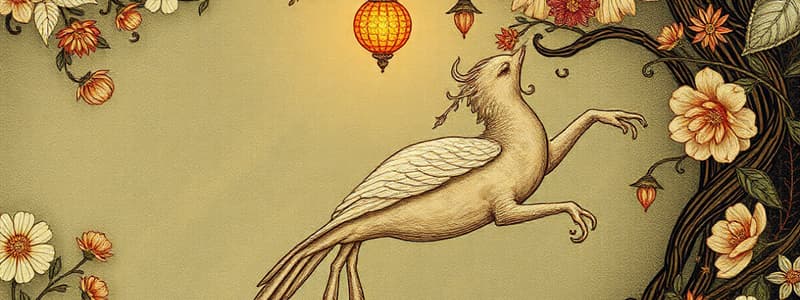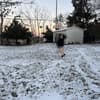Podcast
Questions and Answers
What is a fabilau?
What is a fabilau?
- A long narrative poem about heroism and struggles
- A rhetorical device in which words are repeated in reverse order
- A short and humorous narrative poem from French literature (correct)
- A narrative that describes the origins of gods
What is iambic pentameter?
What is iambic pentameter?
- A line of poetry with no natural pause at the end
- A pattern of two unstressed syllables followed by one stressed syllable
- A form of unrhymed poetry written in iambic pentameter
- A rhythmic pattern of ten syllables per line, with alternating unstressed and stressed syllables (correct)
What is a trochee?
What is a trochee?
- A form of unrhymed poetry
- A rhythmic pattern with two stressed syllables
- A stressed syllable followed by an unstressed syllable (correct)
- A rhetorical device that creates repetition for effect
What is an anapest?
What is an anapest?
What is a dactyl?
What is a dactyl?
What is an end stop in poetry?
What is an end stop in poetry?
What is a caesura in poetry?
What is a caesura in poetry?
What is synecdoche?
What is synecdoche?
What are rhymed couplets?
What are rhymed couplets?
What is an epic?
What is an epic?
What is theogony?
What is theogony?
What does cosmology refer to?
What does cosmology refer to?
What is an allegory?
What is an allegory?
What is satire?
What is satire?
What does intertextuality refer to?
What does intertextuality refer to?
What does Afra refer to?
What does Afra refer to?
What does Romanticism emphasize?
What does Romanticism emphasize?
What is modernity associated with?
What is modernity associated with?
What is antimetabole?
What is antimetabole?
What does surrealism explore?
What does surrealism explore?
What is enjambment in poetry?
What is enjambment in poetry?
What is plot in a narrative?
What is plot in a narrative?
What is blank verse?
What is blank verse?
What is a volta in poetry?
What is a volta in poetry?
What is a metonym?
What is a metonym?
What does surplus refer to in language?
What does surplus refer to in language?
What does defenestration mean?
What does defenestration mean?
What is anagnorisis in literature?
What is anagnorisis in literature?
What is anadiplosis?
What is anadiplosis?
What does catharsis refer to in tragedy?
What does catharsis refer to in tragedy?
What does whimsy refer to in literature?
What does whimsy refer to in literature?
What is ptomaine associated with in literature?
What is ptomaine associated with in literature?
What is hyperbole?
What is hyperbole?
What is syncope in language?
What is syncope in language?
What is alliteration?
What is alliteration?
What does obscenity refer to in literature?
What does obscenity refer to in literature?
What is a paradox?
What is a paradox?
What is epanalepsis?
What is epanalepsis?
What is epistrophe?
What is epistrophe?
What is zeugma?
What is zeugma?
What is a spondee?
What is a spondee?
What is a tragedy?
What is a tragedy?
What is catastrophism in literature?
What is catastrophism in literature?
What is melodrama?
What is melodrama?
Flashcards
Fabilau
Fabilau
A short, humorous narrative poem from French literature, often focusing on bawdy or satirical themes.
Iambic Pentameter
Iambic Pentameter
A rhythmic pattern in poetry consisting of ten syllables per line, with alternating unstressed and stressed syllables (example: 'da-DUM da-DUM da-DUM da-DUM da-DUM').
Trochee
Trochee
A rhythmic pattern in poetry with a stressed syllable followed by an unstressed syllable (example: 'DUM-da').
Anapest
Anapest
Signup and view all the flashcards
Dactyl
Dactyl
Signup and view all the flashcards
Spondee
Spondee
Signup and view all the flashcards
End Stop
End Stop
Signup and view all the flashcards
Caesura
Caesura
Signup and view all the flashcards
Simile
Simile
Signup and view all the flashcards
Synecdoche
Synecdoche
Signup and view all the flashcards
Rhymed Couplets
Rhymed Couplets
Signup and view all the flashcards
Epic
Epic
Signup and view all the flashcards
Theogony
Theogony
Signup and view all the flashcards
Tragedy
Tragedy
Signup and view all the flashcards
Allegory
Allegory
Signup and view all the flashcards
Satire
Satire
Signup and view all the flashcards
Intertextuality
Intertextuality
Signup and view all the flashcards
Afra
Afra
Signup and view all the flashcards
Romanticism
Romanticism
Signup and view all the flashcards
Modernity
Modernity
Signup and view all the flashcards
Antimetabole
Antimetabole
Signup and view all the flashcards
Surrealism
Surrealism
Signup and view all the flashcards
Enjambment
Enjambment
Signup and view all the flashcards
Plot
Plot
Signup and view all the flashcards
Blank Verse
Blank Verse
Signup and view all the flashcards
Volta
Volta
Signup and view all the flashcards
Metonym
Metonym
Signup and view all the flashcards
Surplus
Surplus
Signup and view all the flashcards
Defenestration
Defenestration
Signup and view all the flashcards
Anagnorisis
Anagnorisis
Signup and view all the flashcards
Anadiplosis
Anadiplosis
Signup and view all the flashcards
Catharsis
Catharsis
Signup and view all the flashcards
Whimsy
Whimsy
Signup and view all the flashcards
Hyperbole
Hyperbole
Signup and view all the flashcards
Syncope
Syncope
Signup and view all the flashcards
Alliteration
Alliteration
Signup and view all the flashcards
Obscenity
Obscenity
Signup and view all the flashcards
Paradox
Paradox
Signup and view all the flashcards
Epanalepsis
Epanalepsis
Signup and view all the flashcards
Epistrophe
Epistrophe
Signup and view all the flashcards
Zeugma
Zeugma
Signup and view all the flashcards
Catastrophism
Catastrophism
Signup and view all the flashcards
Melodrama
Melodrama
Signup and view all the flashcards
Study Notes
Literary Devices and Terms
- Fabilau: A long narrative poem focusing on heroism and struggles, often from French literature.
- Iambic Pentameter: A rhythmic pattern of ten syllables per line, alternating unstressed and stressed syllables.
- Trochee: A rhythmic pattern of one stressed syllable followed by an unstressed syllable.
- Anapest: A rhythmic pattern of two unstressed syllables followed by one stressed syllable.
- Dactyl: A rhythmic pattern of one stressed syllable followed by two unstressed syllables.
- Spondee: A rhythmic pattern of two stressed syllables.
- End Stop: A pause at the end of a poetic line, often marked by punctuation.
- Caesura: A pause within a line of poetry, usually marked by punctuation.
- Simile: A figure of speech comparing two unlike things using "like" or "as."
- Synecdoche: A figure of speech where a part represents the whole, or vice-versa.
- Rhymed Couplets: Two consecutive lines of poetry that rhyme.
- Epic: A long narrative poem, often about heroism.
- Theogony: A narrative describing the origins of the gods.
- Cosmology: The study of the universe's origins, structure, and nature.
- Tragedy: A dramatic genre where a character experiences suffering and a downfall.
- Allegory: A narrative where characters, events, and settings symbolize broader ideas or concepts.
- Satire: A genre that uses humor and irony to criticize or mock social norms and behaviors.
- Intertextuality: The relationship between texts and how they influence one another.
- Afra: A term associated with African culture or descent, often used in rhetorical analysis.
- Romanticism: A literary movement emphasizing emotion, nature, and individual experience.
- Modernity: A period marked by significant changes in thought and societal structures.
- Antimetabole: A rhetorical device where a phrase or sentence is repeated in reverse order.
- Surrealism: A literary movement emphasizing the subconscious and irrational, often challenging logical conventions.
- Enjambment: A poetic technique where a sentence continues beyond the end of a line without a pause.
Other Literary Terms
- Plot: Sequence of events in a narrative, including rising action, climax, and resolution.
- Blank Verse: Unrhymed iambic pentameter.
- Volta: A turning point or shift in a poem's tone or argument.
- Metonym: A figure of speech where a related term is used to refer to something.
- Surplus: Excess or abundance in language, often in imagery, meaning, or emotion.
- Defenestration: Act of throwing someone or something out of a window (figuratively or literally)
- Anagnorisis: A moment of critical discovery or recognition.
- Anadiplosis: Repetition of a word or phrase at the end of one clause and the beginning of the next.
- Catharsis: Emotional release or purification experienced by an audience in a drama.
- Whimsy: Playfulness and unexpected elements in literature.
- Ptomaine: A metaphor for decay or corruption
- Hyperbole: Deliberate exaggeration in language.
- Syncope: Omission of a sound or letter within a word.
- Alliteration: Repetition of consonant sounds at the beginning of words.
- Obscenity: Offensive or vulgar language or imagery.
- Paradox: A statement or situation that seems self-contradictory or illogical.
- Epanalepsis: Repetition of a word or phrase at the beginning and end of a sentence, clause, or line.
- Epistrophe: Repetition of a word or phrase at the end of successive clauses or sentences.
- Zeugma: A figure of speech where one word applies to two or more words in a sentence, with each application having a different meaning.
- Catastrophism: A belief that great natural disasters have shaped the world's history.
- Melodrama: Often dramatic, exaggerated characters, emotions, and plots that have a stereotypical progression of events.
Studying That Suits You
Use AI to generate personalized quizzes and flashcards to suit your learning preferences.





